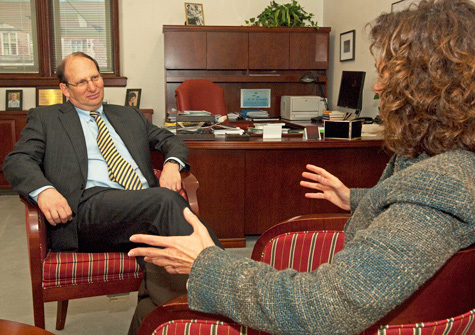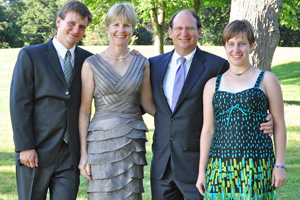
Images of campus past pepper the walls of Henry S. Webber’s office on the first floor of North Brookings Hall. A 1901 photo of Cupples I under construction hangs to the left of a modern-day photo of Cupples from the same angle. Across the room hangs a sketch-up of architectural plans for Brookings Hall.
Webber, since arriving in March 2008 as executive vice chancellor for administration, has spent a great deal of his time evaluating and planning for the physical development of Washington University’s campuses. As he works to shape WUSTL’s future, he also looks for guidance from its past.
“One of the great things about working at a university like this is that you’re building on the strengths of those who came before you,” Webber says. “Washington University has done a remarkable job as it has grown, creating a very attractive, efficient physical plan. The question is, how do we continue that?”
Figuring out the answer — how the university can most effectively and efficiently serve its mission of education, research and patient care — is Webber’s job. As the university’s chief administrative officer, he oversees facilities, campus planning, capital projects, campus security, environmental safety, dining services, summer conferences and off-campus real-estate acquisition and development. He manages operating and capital budgets of more than $250 million annually.
Since coming from the University of Chicago, Webber has led the development of long-term plans for operational sustainability, off-campus housing and an on-campus child-care center. Webber has supervised construction on the South 40 and helped direct the university’s programs in public education, including the new KIPP charter school in South St. Louis, for which WUSTL is a sponsor.
“In his short time here, Hank has led efforts to improve our operational efficiency and has helped us to develop an outstanding strategy for university sustainability,” says Chancellor Mark S. Wrighton. “In addition, Hank has put a lot of energy into thinking about the important role that Washington University plays in the St. Louis region. I am grateful for his leadership during this incredibly important time in our university’s history.”
Among Webber’s long list of achievements at WUSTL, what Webber is most proud of are the relationships he has developed with colleagues. Those relationships served him well the past six months as he worked with Provost Edward S. Macias, Ph.D., executive vice chancellor for academic affairs, and Barbara A. Feiner, vice chancellor for finance and chief financial officer, among others, to determine how departments and offices can succeed despite smaller budgets due to the financial downturn.
The task hasn’t been easy, Macias says, but Webber’s expertise and collaborative nature has helped the process go smoothly.
“I think it is essential for Washington University to have the executive vice chancellor for administration and the provost work well together,” says Macias, the Barbara and David Thomas Distinguished Professor in Arts & Sciences. “This is certainly the case for me and Hank. I appreciate how Hank truly does have Washington University’s best interests at heart. We have been making difficult decisions lately, and his leadership in many areas serves us well.”
In addition to his administrative duties, Webber is a senior lecturer at the George Warren Brown School of Social Work. This spring, he is teaching a course on the political economy of social welfare programs. Teaching is time-consuming, Webber says, but worth the investment.
“There is nothing more exciting than helping a student think about an issue for the first time, and then working with them as they struggle through it,” Webber says. “It doesn’t happen every day, but sometimes you really do influence people’s lives.”
Working for justice
Webber was born in Springfield, Mass. He played second base in little league and dreamed of someday playing for the Boston Red Sox. Webber made the 100-mile, approximately two-hour pilgrimage to Fenway twice a year in the family car and listened to or watched Red Sox games at every chance.
Webber’s father, a salesman for a company that sold cash registers, quit his salesman job while in his early 40s and took a part-time position for the Massachusetts Commission Against Discrimination. Webber’s mother — who previously had stayed at home to take care of Webber and his sister, Susan, and brother, Bruce — went back to work as a teacher to help support the family.
“My parents did a very courageous thing in their 40s,” Webber says. “They took a big pay cut, and my mom went back to work. But they decided that doing work they felt was meaningful was more important than things like fancy vacations.”
Webber’s father’s part-time position grew into a full-time role, and he eventually became chairman of the commission. His mother left teaching to take a position as an affirmative action specialist with the federal government.
After earning a bachelor’s degree in environmental studies from Brown University, the younger Webber searched for some sort of service activity in which he, too, could address social inequity and also explore “somewhere unfamiliar,” Webber says.
He joined the Appalachian Student Health Coalition and traveled throughout the mid-South, promoting rural primary care health plans. That summer, he met Christine Jacobs, a medical student at Vanderbilt University who also was participating in the program. Webber became co-director of the coalition and worked for the next three years for community health programs in Appalachia, spending many free weekends in Nashville to be with Jacobs, his future wife.
In 1982, Webber entered the master of public policy program at Harvard University’s John F. Kennedy School of Government, and Jacobs, who had earned a medical degree, began her residency at Brown University. The couple lived halfway between Cambridge and Providence, a half-hour away from each university.
The trailing spouse
After graduating with a master’s degree in 1984, Webber joined the Massachusetts governor’s office as a policy and budget analyst. The governor gave him the task of helping coordinate the restructuring of the state’s mental health system, which had recently been ranked No. 45 of the 50 states.
“We found that there was a significant set of seriously mentally ill people who would be best served in supervised residences with support rather than huge hospitals with thousands of patients,” Webber says. “It was no more expensive to treat these patients in the community than in the hospital, and it was much better for them.”
Webber remained on the governor’s staff until 1986, when he and Jacobs moved to Kankakee, Ill., about an hour south of Chicago, to honor Jacobs’ public health service commitment to practice medicine in a medically underserved area.
“I became what you call a ‘trailing spouse,’ ” Webber says.

Fortunately, a friend connected Webber with the University of Chicago, which hired Webber as deputy director of financial planning and budget. In 1989, Webber was named the University of Chicago’s assistant vice president for human resources. Five years later, he became the associate vice president for administration, and, in 1997, he was named vice president for community affairs.
In that role and later as vice president of community and government affairs, Webber led the University of Chicago’s efforts to partner with public officials and community leaders to improve the lives of people living in the neighborhoods near the university’s campus on the South Side of Chicago.
Under Webber, the university’s police force expanded to cover Woodlawn and North Kenwood, leading to a sharp reduction in crime. The university founded four charter schools. Webber chaired the oversight board of Consortium on Chicago School Research, a public-school research organization. Webber also worked with community leaders to develop and implement a plan to revitalize the Midway Plaisance, a historic public park that bisects the University of Chicago campus.
The chancellor calls
In 2007, Webber received a call from Wrighton.
“He said there is an open position (executive vice chancellor for administration), and he wanted to know if I had any interest,” Webber says. “It was not a job offer, but an invitation to talk. And you don’t turn down the opportunity to talk to the president of one of the best universities in the world.
“I did my due diligence and immediately saw a set of attractive aspects of the position, including the university’s commitment to playing an important role in St. Louis,” Webber says. “There is a sense that Washington University is an institution that is very well managed, has made great progress and is likely to make great progress in the years ahead.”
Webber and his family arrived in St. Louis in 2008, and Jacobs joined Saint Louis University School of Medicine as an associate professor of family and community medicine. The family settled into a home in the Central West End, an area Webber says offers “the best of urban living” with its collection of restaurants, shops and galleries.
Webber has been quick to get involved in his adopted city, joining the boards of organizations such as the Regional Housing and Community Development Alliance, Forest Park Forever and FOCUS St. Louis, which seeks to foster leadership, influence policy and promote community connections. He has also continued his national service on the Boards of Directors of Chapin Hall Center for Children and ShoreBank Inc., the nation’s largest community development bank.
“It’s important to the university to play a role in contributing to the city,” Webber says. “This is where we are located, where students live, where faculty and staff live. The success of the university has a great deal to do with the success of St. Louis.”
Christine Chadwick, executive director of FOCUS St. Louis, says Webber made it his business upon arriving in St. Louis to “get his arms around” civic affairs. Webber joined the FOCUS St. Louis board in July 2009, and the same traits that make Webber so valuable to the university also make him an important asset to FOCUS.
“What has really impressed me about Hank is his ability to take a good idea and make it a great idea,” Chadwick says. “That’s a gift because most people are satisfied with the good. Hank’s not.”
Fast facts about Henry S. Webber
Born in: Springfield, Mass.
Now lives in: Central West End
Family: Wife, Christine Jacobs, M.D., associate professor of family and community medicine at Saint Louis University; son, Robert, a sophomore at Brown University; and daughter, Hannah, a senior at Clayton High School
Education: B.A., environmental studies, 1980, Brown University; M.P.P, 1984, Harvard University
Favorite book: “All the King’s Men” by Robert Penn Warren
Hobbies: Biking, hiking, skiing, theater and attending many different types of musical performances and concerts ranging from the Saint Louis Symphony to Wilco